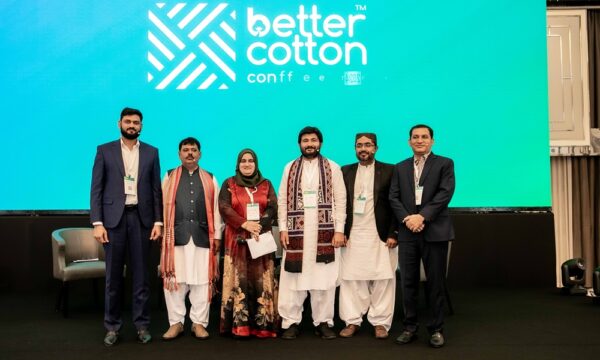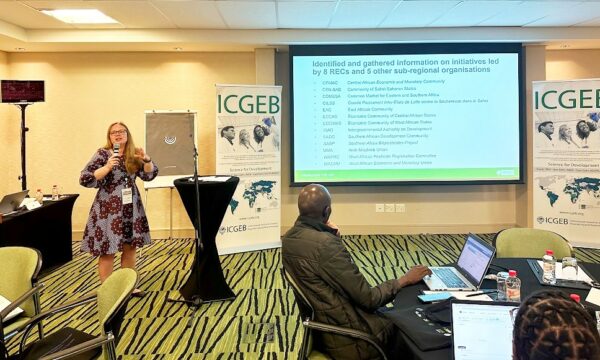
CABI, together with the Pakistani Government’s Department for Plant Protection (DPP), convened a training workshop to help further pave the way for the registration of biopesticides to sustainably tackle crop pests and diseases in Pakistan.
It is hoped that the rollout of the biopesticide registration guidance will promote the uptake of safer-to-use and more environmentally friendly biopesticides in the fight against crop pests and diseases which threaten livelihoods and food security.
By taking a more sustainable approach to crop pests and diseases, it is also anticipated that high levels of aflatoxins and pesticide residues exceeding the maximum residue levels (MRLs) affecting food produce, such as maize, chillies and groundnuts, will be addressed.
The work falls under the PlantwisePlus Pesticide Risk Reduction pathway which recognizes the urgent need to increase the uptake of lower-risk plant protection products by farmers. It is focused on raising awareness of, access to, and use of affordable integrated pest management solutions.
Forty-four participants – including those from the Ministry of National Food Security and Research, DPP, CropLife Pakistan and the Pakistan Crop Protection Association – took part in the four-day event on the ‘Registration of Biopesticides’ in Karachi.
Enhance the understanding and capacity of stakeholders
The workshop, which aimed to enhance the understanding and capacity of stakeholders involved in the biopesticide registration process in Pakistan, followed the approval in November 2023 of a biopesticides registration guidance document.
The document stems from extensive consultations facilitated by CABI that included the DPP and a team of biopesticide experts from the United States Department of Agriculture (USDA) and the Pakistan Agricultural Research Council (PARC).
Agriculture is very important to Pakistan’s economy and people. It is the largest sector, employing over 42% of the workforce and it contributes around 24% to the country’s gross domestic product (GDP).
However, an increased demand for food to meet Pakistan’s growing population – predicted to nearly double to 403 million by 2050 – is challenged by low agricultural productivity due to losses caused by a range of crop pests and diseases.
There is an overreliance on pesticides to try and manage the scourge of crop pests and diseases in Pakistan with the market – currently valued at over $300 million – expected to rise to $500 million in the next five years.
More sustainable pest management solutions
Nevertheless, there has been, in recent years, a focus on food safety and ecosystem conservation that has driven efforts towards more sustainable pest management solutions. As such, the rise of biopesticides products has gained attraction globally.
At the latest workshop, participants learnt from Master Trainer, Mr Luis F. Suguiyama, a renowned regulatory expert from Ag Aligned Global, USA, invaluable insights into international best practices and regulatory frameworks for biopesticides.
Dr Babar Bajwa, CABI’s Senior Regional Director-Asia, spearheaded the workshop with Dr Muhammad Tariq Khan, Director General, Department of Plant Protection, Ministry of National Food Security and Research, Government of Pakistan.
Dr Bajwa said, “The insights and learnings from this workshop will play an important role in shaping the future of biopesticide regulation in Pakistan.
“The collaboration between CABI, the DPP, and other stakeholders sets a strong foundation for ongoing efforts to enhance the regulatory framework and promote sustainable agricultural practices.”
Prosperous agricultural sector for Pakistan
Mr Rana Tanveer Hussain, Federal Minister for National Food Security and Research, Government of Pakistan, in his closing remarks, insisted on building the momentum generated during the workshop and continue working together to create a sustainable and prosperous agricultural sector for Pakistan.
The workshop was also attended by representatives from provincial government departments from agricultural extension services, research and plant protection, leading agricultural universities, and trial conducting agencies.

Additional information
Main image: Thetraining workshop was held to help further pave the way for the registration of biopesticides to sustainably tackle crop pests and diseases in Pakistan (Credit: CABI).
Relevant story
Author
Mr Saqib Ali, Communication Officer, CABI’s centre in Pakistan.
PlantwisePlus
PlantwisePlus aims to reach 75 million smallholder farmers in low and lower-middle income countries, providing them with access to the knowledge and skills they need to improve their production practices.
This will be achieved by supporting countries to predict, prevent, and prepare for plant health threats in the face of a changing climate. This ensures that smallholder farmers reduce their crop losses and produce more and safer food through sustainable crop production practices.
Related News & Blogs
Paving the way for lower-risk crop protection: Biopesticide regulatory pathways
Biopesticides hold great promise for sustainable agriculture, but navigating the regulatory landscape can pose significant hurdles. A recent webinar, Paving the way for lower-risk crop protection: Regulatory pathways for the registration of biopesticid…
11 December 2024




